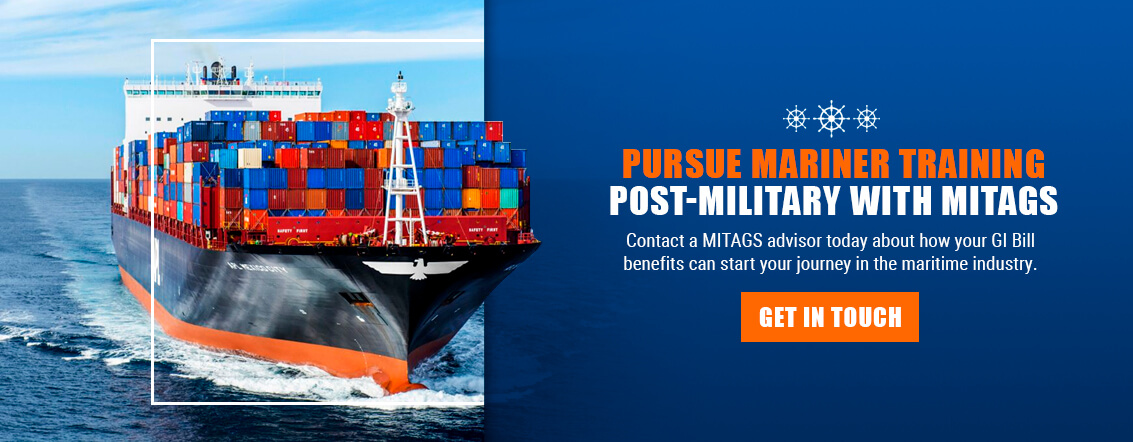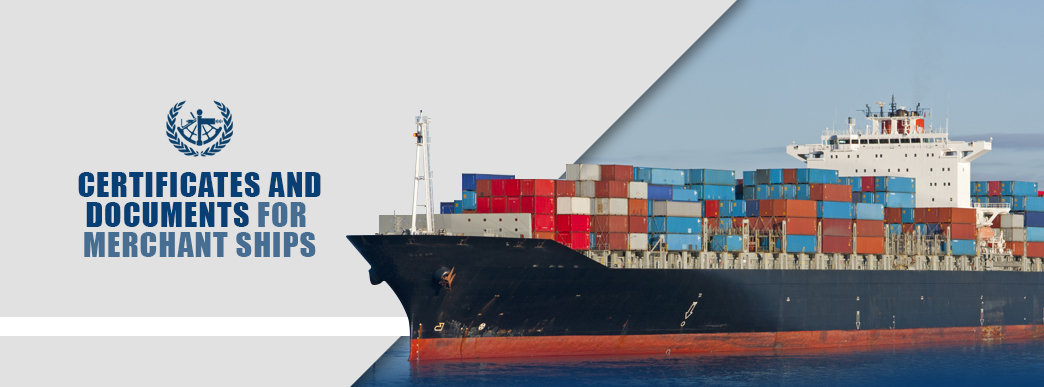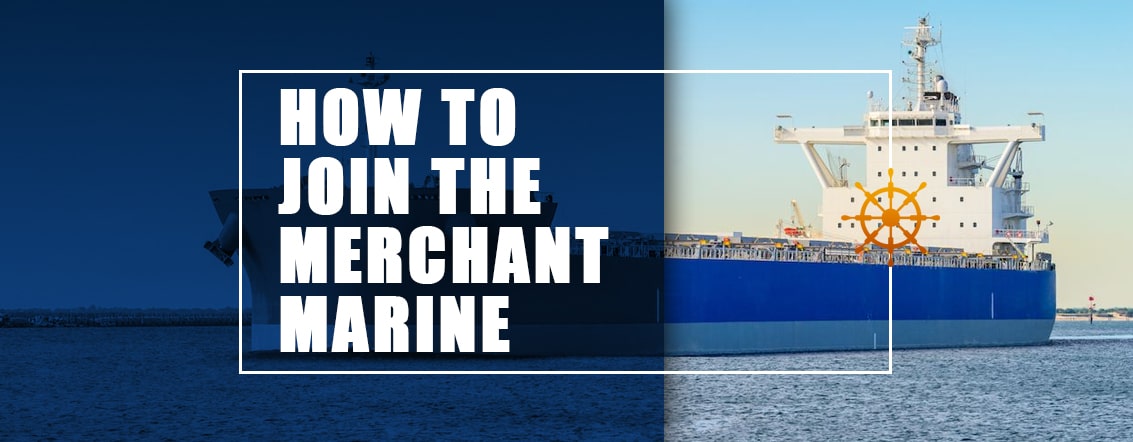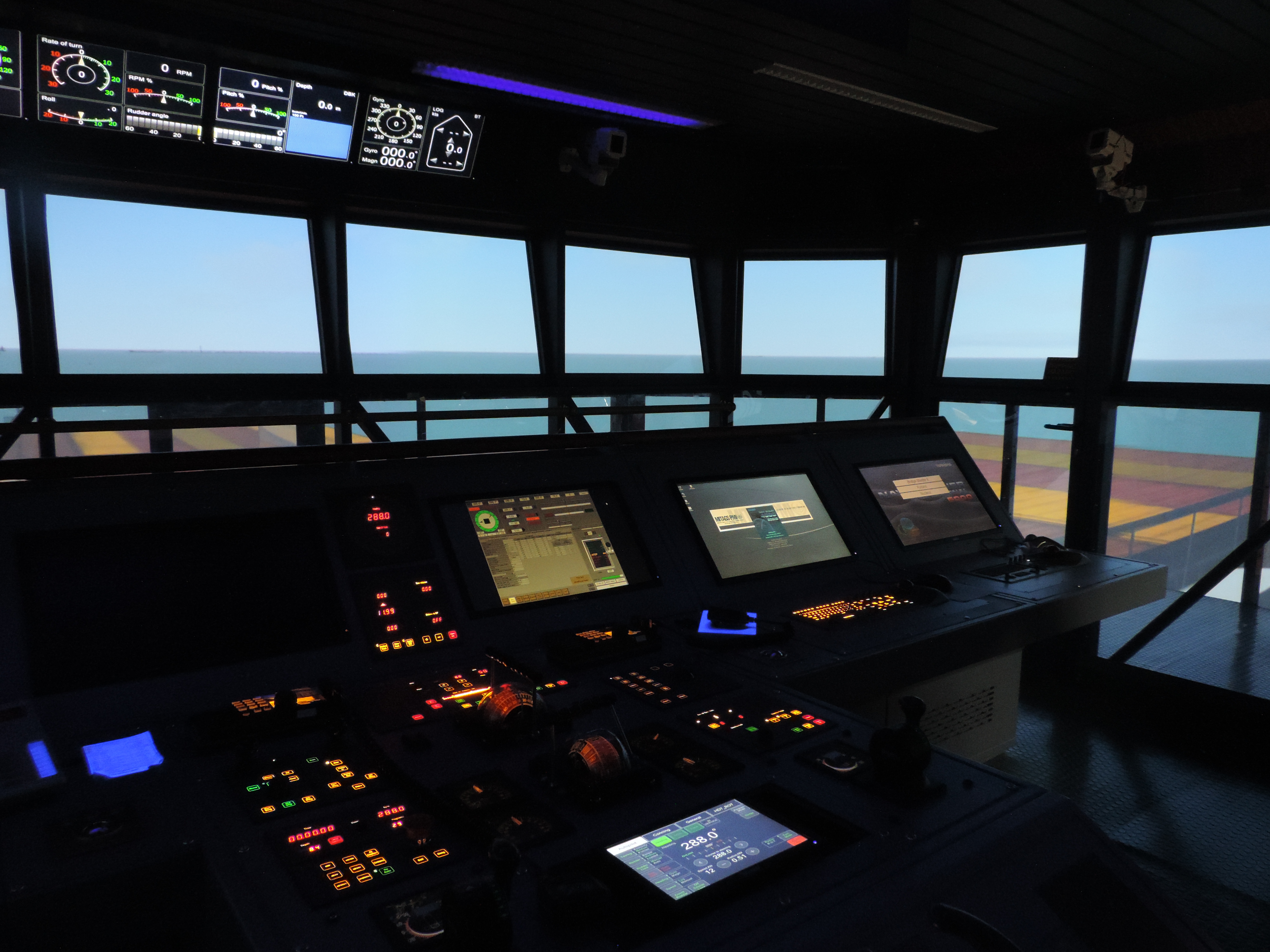It is important to know precisely what your GI Bill benefits can offer you when considering possible career options. If you qualify for GI Bill benefits, you can use those benefits to work toward your dream of a career in the maritime industry.
What Is the GI Bill?
The GI Bill is a piece of U.S. legislation originally signed into law in 1944 to help pay education fees for WWII veterans. Since then, the bill has been amended, with most recent updates occurring after Sept, 11, 2001. You are eligible for the Post-9/11 GI Bill if you:
- Served a minimum of 90 days of military service after Sept. 11, 2001.
- Received a Purple Heart or an honorable discharge after Sept. 11, 2001.
- Served 30 continuous days of service on or after Sept. 11, 2001, and received an honorable discharge with a disability from your time served.
Spouses and dependent children of veterans can also qualify for GI Bill benefits. You can apply to transfer benefits to your spouse or children if you have completed six years of service and enlist in the Defense Enrollment Eligibility Reporting System (DEERS). Further, the GI Bill requires four additional years of military service if you would like to transfer GI Bill benefits.
What Benefits Does the GI Bill Provide?
The GI Bill provides veterans and their families with various benefits, including covering college tuition, training and training program fees. The bill will also provide money and resources for housing costs for veterans or family members during their periods of enrollment. You could also receive up to $500 in moving fees if you are from a very rural area and have to move more than 500 miles for school.
If you need books or other supplies necessary to complete your education, you qualify for up to $1,000 to help pay for your materials every school year. Further, the GI Bill can help cover any necessary tests you may need to attend a program or obtain a license or certification by submitting an application for reimbursement.
How to Transfer GI Bill Benefits to Family
Dependents of veterans, including spouses and children, qualify for up to three years of GI Bill Benefits. If you fit the requirements for veterans wanting to transfer their benefits and agree to four more years of service, you can apply to transfer. Benefits look different depending on whether you choose to move them to a spouse or children:
- Spouses may access benefits as soon as they are available and can apply them during or after active duty. Their benefits last for up to 15 years after active duty. Spouses can continue to access their transferred benefits even after divorce unless you choose to cancel them.
- Children are eligible for transferred GI Bill benefits after you complete 10 years of service, but they can access them while you are away for active service or after returning home. They must be 18 years of age or have obtained their high school diploma. As dependent children, they further qualify for a housing allowance each month. Benefits for children last until they reach the age of 26, even after they move out or get married.
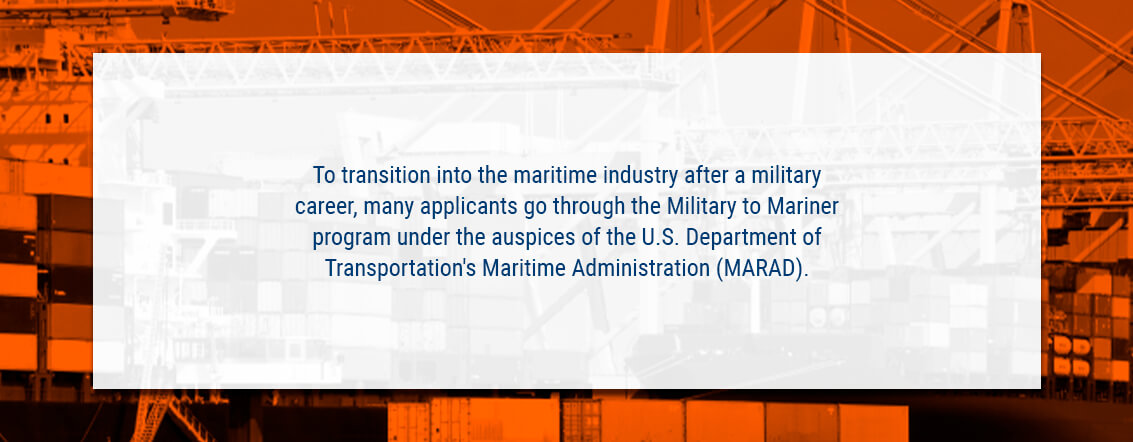
Obtaining My Maritime Education
To transition into the maritime industry after a military career, many applicants go through the Military to Mariner program under the auspices of the U.S. Department of Transportation’s Maritime Administration (MARAD). They can then become part of the U.S. Merchant Marine (USMM), a collection of nongovernmental fleets that includes all U.S. civilian and federally-owned merchant ships and their crews.
Potential mariners must formalize their certification with the Coast Guard. If you want to apply for a Merchant Mariner Credential (MMC), you will need to complete these required steps:
- Determine the officer level and ranking believe you are eligible for.
- Obtain a Transportation Worker Identification Card (TWIC) through the Transportation Security Administration (TSA).
- Fill out the CG-719B Application for an MMC, requesting the license level you previously determined you may qualify for.
- Fill out the CG-719C Conviction Statement, if applicable.
- Submit a CG-719K/E Application for Medical Certificate for Entry Level Ratings or CG-719K Application for Medical Certificate.
- Obtain the necessary drug testing.
- Pay the required fees and print the receipt for inclusion with your application packet.
- Collect documentation of your sea service, if applicable, including your military Transcript of Sea Service (TOSS) or History of Assignments (HOA).
- Obtain all training course assessments or certificates, if applicable.
- Submit all forms and documentation as an application to your U.S. Coast Guard Regional Exam Center (REC).
From the REC, the application will go to the National Maritime Center (NMC) for evaluation, and successful applicants receive their credentials in the mail. Afterward, accepted mariners complete any additional training as needed.
MITAGS helps you build on your military experience and expertise to take the first step toward this credentialing. Using your veterans benefits, you can enroll in our maritime courses to start earning the position of your choice on a vessel. For instance, we offer an entry-level program with our Maritime Apprenticeship Program and can further assist you with your career progression towards an officer-level license with our Able Seaman to Mate and Mate to Master immersive programs, where students continue to learn the necessary skills in the classroom and simulators while also gaining experience at sea.
Benefits of Transitioning From the Military to a Maritime Career
Military career transitioning into the maritime industry has various benefits. Crew members get to travel to both national and international ports, allowing them to explore new places while serving their country in a new and exciting way. You can look forward to traveling often if you have an interest in becoming a merchant mariner.
Merchant Mariners also earn good salaries. On average, U.S. water transportation workers make around $59,250 annually. For ship captains, mates and pilots, the median salary rises to about $77,130 annually. As a merchant mariner, you can rest assured that your hard work and dedication will pay off with a salary that can support you and your family.
Will the GI Bill Pay for My Maritime Education?
The GI Bill supports vocational training endeavors in addition to university programs, allowing the GI Bill to apply to programs at MITAGS, like our Maritime Apprenticeship Programs, AB to Mate, and Mate to Master programs. All you need to be eligible for benefits is to meet regular qualifications and plan to enroll in a training program.
GI Bill and Payment Options
Using the GI Bill and its benefits to pay for tuition and fees depends on the amount of active service you have completed since 9/11. If you have served a minimum of 90 days of service, you are eligible for 50% of your full tuition as of August 2020. Three years of active service equates to full coverage of tuition.
Further payment options, including scholarships, can help veterans and families pay for their education. The Yellow Ribbon Program provides financial aid to veterans to pay for private, graduate or international schools. The Fry Scholarship aids the children and spouses of veterans who passed while actively serving or from a related disability.
GI Bill Coverage at MITAGS
At MITAGS, both our campuses accept the GI Bill and its benefits for our comprehensive and vocational training programs including our Maritime Apprenticeship, AB to Mate, and Mate to Master Programs. As you study and work to earn the skills and experiences necessary to advance in the industry, you can rest assured knowing your GI Bill benefits will serve you and your goals.
Additionally, individual courses can receive benefits from the GI Bill at our West Coast campus in Seattle, Washington.
Pursue Mariner Training Post-Military With MITAGS
With programs covered by GI Bill benefits, MITAGS can help you reach your goals of working in the maritime industry. Contact a MITAGS advisor today about how your GI Bill benefits can start your journey in the maritime industry.
GI Bill is a registered trademark of the U.S. Department of Veterans Affairs (VA). More information about education benefits offered by VA is available at the official U.S. government Web site at https://www.benefits.va.gov/gibill.


